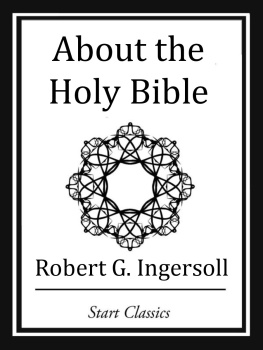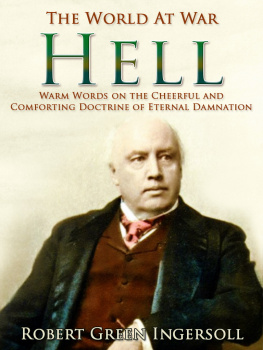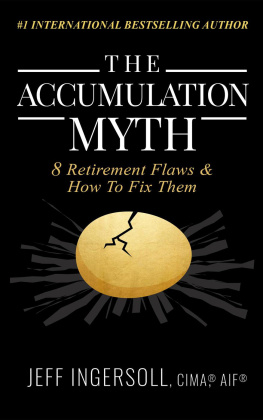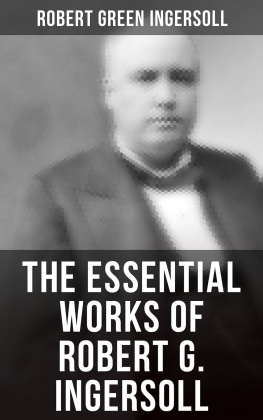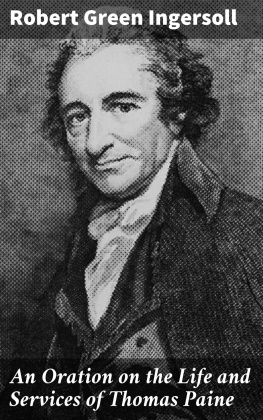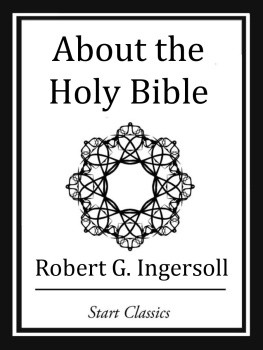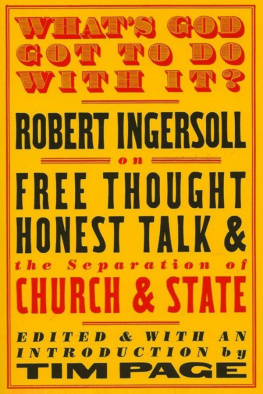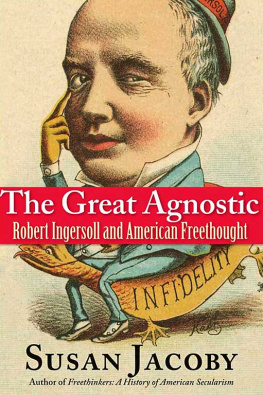About the Holy Bible
By Robert G. Ingersoll
I
THE ORIGIN OF THE BIBLE.
A few wandering families -- poor, wretched, without education, art or power; descendants of those who had been enslaved for four hundred years; ignorant as the inhabitants of Central Africa, had just escaped from their masters to the desert of Sinai. Their leader was Moses, a man who had been raised in the family of Pharaoh and had been taught the law and mythology of Egypt. For the purpose of controlling his followers he pretended that he was instructed and assisted by Jehovah, the God of these wanderers.
Everything that happened was attributed to the interference of this God. Moses declared that he met this God face to face; that on Sinai's top from the hands of this God he had received the tables of stone on which, by the finger of this God, the Ten Commandments had been written, and that, in addition to this, Jehovah had made known the sacrifices and ceremonies that were pleasing to him and the laws by which the people should be governed.
In this way the Jewish religion and the Mosaic Code were established.
It is now claimed that this religion and these laws were and are revealed and established for all mankind.
At that time these wanderers had no commerce with other nations, they had no written language, they could neither read nor write. They had no means by which they could make this revelation known to other nations, and so it remained buried in the jargon of a few ignorant, impoverished and unknown tribes for more than two thousand year's.
Many centuries after Moses, the leader, was dead many centuries after all his followers had passed away -- the Pentateuch was written, the work of many writers, and to give it force and authority it was claimed that Moses was the author.
We now know that the Pentateuch was not written by Moses.
Towns are mentioned that were not in existence when Moses lived.
Money, not coined until centuries after his death, is mentioned.
So, many of the laws were not applicable to wanderers on the desert -- laws about agriculture, about the sacrifice of oxen, sheep and doves, about the weaving of cloth, about ornaments of gold and silver, about the cultivation of land, about harvest, about the threshing of grain, about houses and temples, about cities of refuge, and about many other subjects of no possible application to a few starving wanderers over the sands and rocks.
It is now not only admitted by intelligent and honest theologians that Moses was not the author of the Pentateuch, but they all admit that no one knows who the authors were, or who wrote any one of these books, or a chapter or a line. We know that the books were not written in the same generation; that they were not all written by one person; that they are filled with mistakes and contradictions. It is also admitted that Joshua did not write the book that bears his name, because it refers to events that did not happen until long after his death.
No one knows, or pretends to know, the author of Judges; all we know is that it was written centuries after all the judges had ceased to exist. No one knows the author of Ruth, nor of First and Second Samuel; all we know is that Samuel did not write the books that bear his name. In the 25th chapter of First Samuel is an account of the raising of Samuel by the Witch of Endor.
No one knows the author of First and Second Kings or First and Second Chronicles; all we know is that these books are of no value.
We know that the Psalms were not written by David. In the Psalms the Captivity is spoken of, and that did not happen until about five hundred years after David slept with his fathers.
We know that Solomon did not write the Proverbs or the Song; that Isaiah was not the author of the book that bears his name; that no one knows the author of Job, Ecclesiastes, or Esther, or of any book in the Old Testament, with the exception of Ezra.
We know that God is not mentioned or in any way referred to in the book of Esther. We know, too, that the book is cruel, absurd and impossible.
God is not mentioned in the Song of Solomon, the best book in the Old Testament.
And we know that Ecclesiastes was written by an unbeliever.
We know, too, that the Jews themselves had not decided as to what books were inspired -- were authentic -- until the second century after Christ.
We know that the idea of inspiration was of slow growth, and that the inspiration was determined by those who had certain ends to accomplish.
II
IS THE OLD TESTAMENT INSPIRED?
If it is, it should be a book that no man -- no number of men -- could produce.
It should contain the perfection of philosophy.
It should perfectly accord with every fact in nature.
There should be no mistakes in astronomy, geology, or as to any subject or science.
Its morality should be the highest, the purest.
Its laws and regulations for the control of conduct should be just, wise, perfect, and perfectly adapted to the accomplishment of the ends desired.
It should contain nothing calculated to make man cruel, revengeful, vindictive or infamous.
It should be filled with intelligence, justice, purity, honesty, mercy and the spirit of liberty.
It should be opposed to strife and war, to slavery and lust, to ignorance, credulity and superstition.
It should develop the brain and civilize the heart.
It should satisfy the heart and brain of the best and wisest.
It should be true.
Does the Old Testament satisfy this standard?
Is there anything in the Old Testament -- in history, in theory, in law, in government, in morality, in science -- above and beyond the ideas, the beliefs, the customs and prejudices of its authors and the people among whom they lived?
Is there one ray of light from any supernatural source?
The ancient Hebrews believed that this earth was the center of the universe, and that the sun, moon and stars were specks in the sky.
With this the Bible agrees.
They thought the earth was flat, with four corners; that the sky, the firmament, was solid -- the floor of Jehovah's house.
The Bible teaches the same.
They imagined that the sun journeyed about the earth, and that by stopping the sun the day could be lengthened.
The Bible agrees with this.
They believed that Adam and Eve were the first man and woman; that they had been created but a few years before, and that they, the Hebrews, were their direct descendants.
This the Bible teaches.
If anything is, or can be, certain, the writers of the Bible were mistaken about creation, astronomy, geology; about the causes of phenomena, the origin of evil and the cause of death.
Now, it must be admitted that if an infinite Being is the author of the Bible, he knew all sciences, all facts, and could not have made a mistake.
If, then, there are mistakes, misconceptions, false theories, ignorant myths and blunders in the Bible, it must have been written by finite beings; that is to say, by ignorant and mistaken men.
Nothing can be clearer than this.
For centuries the church insisted that the Bible was absolutely true; that it contained no mistakes; that the story of creation was true; that its astronomy and geology were in accord with the facts; that the scientists who differed with the Old Testament were infidels and atheists.
Now this has changed. The educated Christians admit that the writers of the Bible were not inspired as to any science. They now say that God, or Jehovah, did not inspire the writers of his book for the purpose of instructing the world about astronomy, geology, or any science. They now admit that the inspired men who wrote the Old Testament knew nothing about any science, and that they wrote about the earth and stars, the sun and moon, in accordance with the general ignorance of the time.

